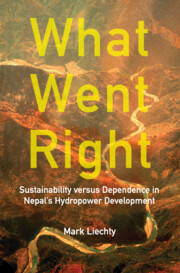Book contents
- Frontmatter
- Dedication
- Contents
- Preface
- Acknowledgments
- List of Abbreviations
- 1 A Corporate Vision: Business as Development Philosophy
- 2 The Butwal Technical Institute, Tinau, and the Origins of the Butwal Power Company
- 3 Andhi Khola
- 4 Jhimruk
- 5 The “Great Upheaval”: Khimti and the Limits of the Hoftun Hydropower Vision
- 6 Melamchi and the Rush to Privatization
- 7 Privatization: The Long Haul
- 8 The New BPC: Cultures in Conflict
- 9 Conclusion: From Seed, to Plant, to Seed
- Bibliography
- Index
- Miscellaneous Endmatter
4 - Jhimruk
Published online by Cambridge University Press: 23 April 2022
- Frontmatter
- Dedication
- Contents
- Preface
- Acknowledgments
- List of Abbreviations
- 1 A Corporate Vision: Business as Development Philosophy
- 2 The Butwal Technical Institute, Tinau, and the Origins of the Butwal Power Company
- 3 Andhi Khola
- 4 Jhimruk
- 5 The “Great Upheaval”: Khimti and the Limits of the Hoftun Hydropower Vision
- 6 Melamchi and the Rush to Privatization
- 7 Privatization: The Long Haul
- 8 The New BPC: Cultures in Conflict
- 9 Conclusion: From Seed, to Plant, to Seed
- Bibliography
- Index
- Miscellaneous Endmatter
Summary
While the Andhi Khola project is a veritable model of successful community-based hydropower development, the Butwal Power Company's (BPC’s) next project—on the Jhimruk Khola in Pyuthan District—was a much more ambiguous achievement. Andhi Khola received international recognition for its technical and social innovations even while it generated power for a remarkably low price in terms of initial investment. The Jhimruk project too admirably succeeded in achieving its technical goals of boosting levels of professionalism for BPC and its collaborating companies while building a high-quality power plant on time and within budget. But whereas the Andhi Khola project had carefully worked to cultivate good relations with the local community and integrate community goals and concerns into the larger project from start to finish, at Jhimruk community relations started off on the wrong foot and deteriorated from there. While development experts now often point to Andhi Khola as an exemplary case study, the Jhimruk project is more likely to serve as the opposite—an example of what can go wrong without careful consideration of local conditions—both social and environmental. Even now, more than two decades after its commissioning, the Jhimruk project is the target of local hostility and mired in political controversy (Kunwar 2016), as well as unforeseen environmental problems.
At the root of this contrast between Andhi Khola and Jhimruk is the fundamental difference in how the projects were conceived and implemented. Whereas Odd Hoftun and the United Mission to Nepal (UMN) had initiated Andhi Khola (like Tinau before it) as part of Hoftun's larger vision of promoting industrial development through hydropower and skilled Nepali labor, Jhimruk was a commissioned project taken on by BPC at the request of the Nepal government. Because BPC was officially just fulfilling a government contract, they expected that the government itself would assume full responsibility for the finished project. Rather than laying the groundwork for a long-term relationship with the community as they had done at Andhi Khola, at Jhimruk BPC saw its role as almost entirely technical: it would deliver a product (a power plant) to a consumer (the Nepal government) and then walk away.
- Type
- Chapter
- Information
- What Went RightSustainability Versus Dependence in Nepal's Hydropower Development, pp. 83 - 112Publisher: Cambridge University PressPrint publication year: 2022



